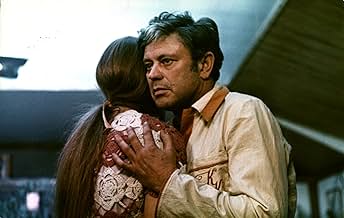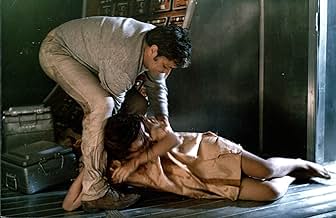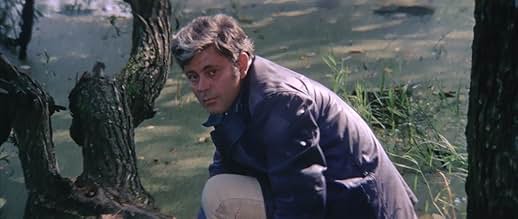Um psicólogo é enviado a uma estação na órbita de um planeta distante para descobrir o que levou sua tripulação à loucura.Um psicólogo é enviado a uma estação na órbita de um planeta distante para descobrir o que levou sua tripulação à loucura.Um psicólogo é enviado a uma estação na órbita de um planeta distante para descobrir o que levou sua tripulação à loucura.
- Direção
- Roteiristas
- Artistas
- Prêmios
- 2 vitórias e 4 indicações no total
- Doktor Snaut, kibernetik
- (as Yuri Yarvet)
- Mat Krisa Kelvina
- (as O. Barnet)
- Syn Anri Bertona
- (as V. Kerdimun)
- Gostya doktora Gribaryana
- (as O. Kizilova)
- Plemyannitsa Krisa Kelvina
- (as T. Malykh)
- Shanakhan, predsedatel komissii Anri Bertona
- (as A. Misharin)
- Professor Tarkhe
- (as B. Oganesyan)
- Anna, tetka Krisa Kelvina
- (as T. Ogorodnikova)
- Doktor Gribaryan, fiziolog
- (as S. Sarkisyan)
- Predsedatel nauchnoy konferentsii
- (as Yu. Semyonov)
- Chlen uchenogo soveta
- (as V. Statsinskiy)
- Professor Messendzher
- (as G. Teykh)
- Direção
- Roteiristas
- Elenco e equipe completos
- Produção, bilheteria e muito mais no IMDbPro
Avaliações em destaque
As such, using Lem's original idea, Tarkovsky successfully, explores these themes.
We are drawn in, through hauntingly beautiful imagery, to the internal struggles of Kris Kelvin as he attempts to understand feelings of love for his suicided wife, who has been mysteriously resurrected, presumably as an attempt by Solaris to communicate, or torture.
Of course Solaris is probably the most original alien ever concocted, (no phone-homes here) and as must be, utterly enigmatic and beyond communication.
Be warned, this film is very long, and sometimes slow, but for those who consider themselves science fiction addicts, it is a must view.
One of the top 5 sci-fi films of all time.
So comes December 2009, and Film 4 show both Solaris films. I sat transfixed by the Russian film. Visually it is a thing of beauty, and it is a rare thing - a film which requires input from the viewer. This movie requires you to think for yourself...and some people find that difficult.
I enjoy a rip-snorting entertaining action movie as much as most people, but rare films like Solaris leave me feeling so much more fulfilled. There are ambiguities, not so much loose ends untied as dots which the viewer is required to connect for himself.
Try Solaris. If you find yourself twiddling your thumbs after 15 minutes then its probably not for you. If you find yourself glued to the screen then you know how I feel about this film.
It raises a lot of interesting questions about the nature of humanity, conscience, love, etc. which, honestly, I'd never thought to ask before, and don't care enough to answer now that they HAVE been asked. (Will Shame really save humanity? Who knows? Maybe. How will it do that? Haven't a clue. Now what's for lunch?) That's not to say I didn't like the movie. I did. It's very beautifully shot, such that I think it would be worth purchasing, even if I never sit through the whole thing again, just so that I can have scenes like "City of the Future" on hand as a reference for my own film-making endeavors.
Speaking of which: "City of the Future" is a very long scene consisting entirely of one character driving through the streets of Japan. It's supposed to look like, well, a city of the future, but to modern American audiences, it won't very much. It just looks like a guy driving his car through a series of tunnels, and past a series of skyscrapers, as day turns gradually into night. It goes on for five minutes.
But here's the thing, the paradox of this film: It didn't bother me that there is a five minute sequence consisting of nothing but shots of traffic. In fact, I loved it. It's an amazing scene, really quite beautiful in its own way. And a lot of the film is like that. It's slow and confusing, but still, it's never boring. Even once Kelvin gets aboard the Space Station, wherein 90% of the decor looks exactly the same. It's still fascinating to look at.
And the weird thing is, I can't figure out why. I mean, when I tried to watch 2001, another very long, beautifully shot movie set largely in space... I was bored literally to tears in the first 10 minutes, and had to shut it off. (No offense to fans of the film; I realize how incredibly crass I am for failing to recognize the genius of 2001. It's something I will just have to come to terms with on my own.) But for some reason, while watching Solaris, even when absolutely nothing was happening, I could not tear my eyes away. I have the strangest feeling that, if I were indeed to watch the movie again--without the subtitles--it could become one of my all-time favorites.
I don't know if I can recommend this film to others or not, because I have no idea if anyone else will share my sentiments. I don't know who will understand it and who won't, or who will even think it's worth trying to understand. There are, of course, some people who absolutely love it, and probably even some who understand it (or think they do), because... well, it's a classic, and a movie doesn't become a classic if nobody likes or understands it. But there are probably just as many people who hate it, because... well, it's a three-hour Russian movie.
At any rate, though, I think it's at least worth a look. If you find it boring, slow, incomprehensible, whatever... just turn it off. No big deal. But, on the other hand, if you find yourself inexplicably compelled to keep watching, unwilling or unable to tear yourself away for a single frame... well, then, you're welcome.
I watched Solyaris twice in two days, because the first time I saw it I knew that I hadn't processed even a quarter of what I knew was there. I was taken completely aback. The second viewing was extremely rewarding.
It was unusual for me, raised as I was on the sledgehammer moralizing and we'll make our point so obvious that there's no way you can miss it because we have no respect for your intelligence way of American film. I'm a huge literature buff, and this was one of the very few films I've confronted that is thoughtful and has so many things to say yet does it in a literary or poetic fashion.
You will get out of this film what you bring to it. I've been to so many movies where the audience is not actually participating, it's being attacked. But true art is not domineering; it woos you.
So to sum up, I greatly appreciated Tarkovsky's unwillingness to manipulate the viewer. It showed that he had respect for me as a thinking soul, and it is this love and respect for humanity which makes this a truly great film.
The basic story is that a Russian spaceship in orbit around a planet has been sending back confusing status, and Kris Kelvin (Donatas Banionis) is sent to investigate. He finds out that the crew has been experimenting with sending pulses of radiation into the planet's vast ocean and are in turn manipulated by some sort of innate intelligence on the planet. "Guests" materialize on the ship, crafted from mental elements of the crews' minds.
The first night there, Kris himself wakes up to find his long-dead love Hari (Natalya Bondarchuk) by his side. The other two crew mates, scientists Dr. Snaut (Jüri Järvet) and Dr. Sartorius (Anatoli Solonitsyn) puncture any misconceptions that Kris may have by clarifying that "she" is not real, and invite Kris to try looking at a blood sample, which clearly is not human ("she" does "bleed" when hurt, but the "blood" can be easily wiped away). The scientists in fact want to experiment on sending an annihilation sacrificial pulse of radiation to the ocean below, and imply, it seems, an interest in using Hari for that purpose.
The film is unlike anything that I have seen before, and begs many philosophic questions about the nature of reality and existence, the meaning of love, time and timelessness, and much more. The sterile and very unnatural milieu of the spaceship, as well as the melancholic and minimalistic music and sound effects, make one despair for being in nature, and reflect on the early lakeside scenes. The ending (no spoilers here!) leaves room for interpretation and even understanding of just what happened. Hauntingly amazing.
Você sabia?
- CuriosidadesThis was the most widely seen of Andrei Tarkovsky's films outside of the Soviet Union. However, Tarkovsky himself reportedly considered it the least favorite of the films he directed. Not being a fan of the science fiction genre (which he criticized for its "comic book trappings and vulgar commercialism"), he was nevertheless persuaded to propose this adaptation of the eponymous and popular sci-fi novel 'Solaris' to appease the Soviet censors. However, he considered the film an artistic failure because of its need for technological dialogue and special effects, which prevented it from transcending its genre; something he believed his movie Stalker (1979) did better.
- Erros de gravaçãoAt the moment when the station attains zero gravity, the candlestick passes floating in the air, with the flames burning the same as in earth. Actually, with zero gravity, the fire doesn't go upward, candle flames would rather be spherical and very weak (blue).
- Citações
Dr. Snaut: Science? Nonsense! In this situation mediocrity and genius are equally useless! I must tell you that we really have no desire to conquer any cosmos. We want to extend the Earth up to its borders. We don't know what to do with other worlds. We don't need other worlds. We need a mirror. We struggle to make contact, but we'll never achieve it. We are in a ridiculous predicament of man pursuing a goal that he fears and that he really does not need. Man needs man!
- Versões alternativasThe Region-4 DVD was released by Shock as part of its Distinction Series and runs at 2 hours and 49 minutes, with some noticeable cut scenes throughout the films. This 2-disc set doesn't contain any deleted/alternate scenes.
- ConexõesEdited into Spisok korabley (2008)
- Trilhas sonorasThe Little Organ Book: Ich Ruf Zu Dir, Herr Jesu Christ - BWV 639
Composed by Johann Sebastian Bach (as I. S. Bakh)
Principais escolhas
Detalhes
- Data de lançamento
- País de origem
- Centrais de atendimento oficiais
- Idiomas
- Também conhecido como
- Điều Tạo Nên Con Người
- Locações de filme
- Akasaka, Minato, Japão(Berton's car scenes)
- Empresas de produção
- Consulte mais créditos da empresa na IMDbPro
Bilheteria
- Orçamento
- RUR 1.000.000 (estimativa)
- Faturamento bruto nos EUA e Canadá
- US$ 22.168
- Fim de semana de estreia nos EUA e Canadá
- US$ 11.537
- 15 de set. de 2002
- Faturamento bruto mundial
- US$ 230.989
- Tempo de duração
- 2 h 47 min(167 min)
- Cor
- Mixagem de som
- Proporção
- 2.35 : 1








































